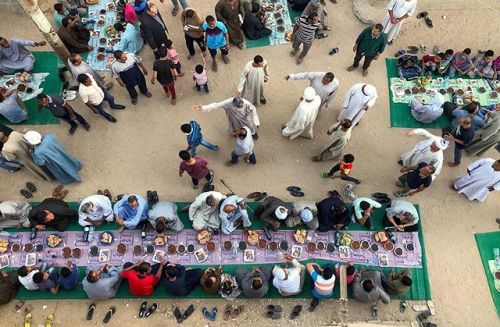There are a number of highly recommended worshipful practices to be performed during the days of Ramadan, for those who seek closeness to their Lord and His pleasure.
Partaking of Food Prior to Commencing the Fast
It is recommended to partake of a light meal (suhoor) prior to commencing the fast. The fast begins at first light and ends at sunset (maghrib).
“Eat some food before the fast begins, there is blessing in its partaking.” [Bukhari and Muslim]
Zaid, the son of Thabit related: “We partook of suhoor (food before the commencement of the fast) during Ramadan with the Messenger of Allah and then stood up for prayer.
He was asked what was the interval of time between the two, so he replied: ‘The time it takes to recite fifty verses (of the Quran).’”
The Messenger of Allah, praise and peace be upon him, said: “My nation will remain in goodness as long as they break the fast as soon as it is due.” [Muslim]
Joy When Breaking the Fast
The fast is broken at sunset, and it is termed in Arabic iftar. It is a time of happiness and refreshment after experiencing the pangs of hunger and thirst. It is usually broken with dates and in many cultures a light soup with bread or small side dishes. Breaking the fast is followed immediately by the evening obligatory prayer. In many parts of the world, including the US, breaking fast is observed in congregation in mosques and homes.
The Prophet (s) said: “Whosoever fasts experiences two joys. He is joyful when he breaks his fast, and is joyful because of his fasting when he meets his Lord.”
“When evening approaches from this side (east) and the day retreats from this side (west) and the sun has set, the one who is fasting breaks his fast.” [Bukhari and Muslim]
“Break your fast with a date, or with water because it is pure.” [Abu Daud and Tirmidhi]
Generosity and Good Deeds During the Month of Fasting
Our beloved prophet, Prophet Muhammad, praise and peace be upon him, spoke on many occasions about the fast of Ramadan.
He informed us of the way in which we should prepare ourselves as well as urging us to do good, to be charitable, and to refrain from ways in which our fast would become invalid.
Narrated Ibn ‘Abbas: The Prophet was the most generous amongst the people, and he used to be more so in the month of Ramadan when Gabriel visited him, and Gabriel used to meet him on every night of Ramadan till the end of the month. The Prophet used to recite the Holy Qur’an to Gabriel, and when Gabriel met him, he used to be more generous than a fast wind (which causes rain and welfare). [Bukhari].
Narrated Abu Huraira: The Prophet said, “Whoever does not give up forged speech and evil actions, Allah is not in need of his leaving his food and drink (i.e. Allah will not accept his fasting.)” [Bukhari].
“Allah, the Mighty, the Glorified says: ‘All the deeds of the son of Adam are for himself, but his fasting is for Me and I shall reward him for it.
The fast is a shield. When any of you fasts he should forsake swearing and noise.’”
Retreat – ‘Itikaf
Regarding the retreat, it was the practice of the Prophet, praise and peace be upon him, to retreat to the Mosque during the last ten days and nights of Ramadan, fasten his cloak around his waist and encourage his family to do the same. His time in the Mosque was spent in worship and not in idle talk.
If it is one’s intention to offer the retreat then there are specific rules to be observed:
- Once the intention or vow has been taken to observe these days of continuous retreat, the continuity of its observance is broken if he leaves the mosque without a justifiable necessity, such as to attend a funeral.
- However, the observance is not broken when one leaves to go to the toilet. Those in retreat are permitted to renew their ablutions in their own home, but the restatement of the intent must be renewed unless the intention to spend the ten days in advance has been made. Any form of business to and from the mosque is not permissible.
- It was the practice of the Messenger of Allah, praise and peace be upon him, not to leave the mosque except for the call of nature. Neither would he inquire about a sick person except as he passed by without stopping.
- Sleeping, eating, washing hands in the mosque do not invalidate the retreat, nor yet the emergence of a limb or part of the body from the mosque.
- Sexual intercourse invalidates the observance of the retreat, but not a non-arousing kiss.
The Messenger of Allah, praise and peace be upon him, would go into seclusion for (the last) ten days during the month of Ramadan, but the year in which he passed away he went into seclusion for twenty days.
[Bukhari]
Narrated ‘Aisha: “Allah’s Apostle used to practice `Itikaf in the last ten nights of Ramadan and used to say, ‘Look for the Night of Qadr in the last ten nights of the month of Ramadan’”. [Bukhari]
Narrated ‘Aisha (r) (the Mother of the Believers):” Allah’s Apostle used to let his head in (the house) while he was in the mosque and I would comb and oil his hair. When in `Itikaf he used not to enter the house except for a need.” [Bukhari]
Recitation of Quran
It was the practice of the Prophet (peace be upon him) to recite the entirety of the Quran during Ramadan, and in his last year of life (s) he recited it twice.
It has become a common practice in Muslim countries and especially in the United States, to recite the entirety of the Quran during the voluntary congregational worship of Ramadan, taraweeh. This is usually done by reciting one-thirtieth or thereabouts each night.
Narrated Ibn ‘Abbas: The Prophet was the most generous amongst the people, and he used to be more so in the month of Ramadan when Gabriel visited him, and Gabriel used to meet him on every night of Ramadan till the end of the month. The Prophet used to recite the Holy Qur’an to Gabriel, and when Gabriel met him, he used to be more generous than a fast wind (which causes rain and welfare). [Bukhari]
Taraweeh
It was the practice of the Prophet (s) to perform extra devotional prayers during the night during the month of Ramadan. These are called taraweeh. He prayed this special prayer only three times in congregation during his lifetime, after which he prayed it in his private apartment, fearing it would become a burden on his community.
Later Sayiddina `Umar, may God be pleased with him, second of the Successors of the Prophet (s), ordained that the congregational prayer should become a major institution of Ramadan and established it as a form of nightly congregational worship, though remaining optional in nature. Upon seeing the benefits and blessings pertaining thereto he stated “what an excellent innovation this is!” – “na’imatul-bida` hadhihi” [Bukhari].
According to the major schools of Islamic law (Maliki, Hanifi, Shafi’i and Hanbali) the taraweeh consists of 20 cycles of prostration (raka`ts).
Narrated Abu Huraira: “I heard Allah’s Apostle saying regarding Ramadan, “Whoever prayed at night in it (the month of Ramadan) out of sincere Faith and hoping for a reward from Allah, then all his previous sins will be forgiven.” [Bukhari]
Ibn Shihab said, “Allah’s Apostle died and the people continued observing that (i.e. Nawafil offered individually, not in congregation), and it remained as it was during the Caliphate of Abu Bakr and in the early days of ‘Umar’s Caliphate.” ‘Abdur Rahman bin ‘Abdul Qari said, “I went out in the company of ‘Umar bin Al-Khattab one night in Ramadan to the mosque and found the people praying in different groups. A man praying alone or a man praying with a little group behind him. So, ‘Umar said, ‘In my opinion I would better collect these (people) under the leadership of one Qari (Reciter) (i.e. let them pray in congregation!)’. So, he made up his mind to congregate them behind Ubai bin Ka’b. Then on another night I went again in his company and the people were praying behind their reciter. On that, ‘Umar remarked, ‘What an excellent Bid’a (i.e. innovation in religion) this is; but the prayer which they do not perform, but sleep at its time is better than the one they are offering.’ He meant the prayer in the last part of the night. (In those days) people used to pray in the early part of the night.” [Bukhari, Vol. 3, Book 32, Number 227]
Sa’eeb ibn Yazid, who said: ” In the time of Umar ibn al-Khattab (r) the people used to observe 20 rak’ahs and the witr.”
[Al-Bayhaqi related it in al-Marifa]
Sa’eeb ibn Yazid, who said: “In the time of Umar ibn al-Khattab, radiallahu anhu, they would perform 20 rak’ats in the month of Ramadan. He said (also): And they would recite the Mi’in[9], and they would lean on their sticks in the time of Uthman ibn Affan, (r), from the discomfort of standing.” [Bayhaqi in al-Sunan]
The Night of Power
It is during the last ten nights of Ramadan that the Night of Power occurs. By the consensus of many scholars it is most probable that the Night of Power falls on an odd night such as 21st, 23rd, 25th or the 27th.
About this night, God, the Glorious and Exalted said:
In the name of God, the Beneficent the Merciful
Indeed We sent it [the Holy Quran] down on the Night of Power.
What will convey to you what the Night of Power is like!
Better is the Night of Power than a
thousand months
in that Night the angels and the Spirit descend
by the permission of their Lord for every affair.
Peace it is, till the break of dawn. [Quran, Chapter 97]
The Messenger of Allah, praise and peace be upon him, said: “Whosoever offers voluntary prayers during the Night of Power out of belief and charging Allah with its recompense will have his past sins forgiven.” [Bukhari and Muslim]
Some of the companions of the Messenger of Allah, praise and peace be upon him, had a vision that the Night of Power was among the last seven nights of Ramadan, whereupon the Messenger of Allah said: “I see that your visions all agree upon the last seven nights. Whoever, then, seeks the Night of Power should look for it among the last seven nights of Ramadan.” [Bukhari and Muslim]
The Messenger of Allah, praise and peace be upon him, would go into seclusion in the Mosque during the last ten days of Ramadan and said: “Look for the Night of Power among the last ten nights of Ramadan.” [Bukhari and Muslim]
Lady Ayesha, Mother of Believers, may Allah be pleased with her relates “I asked the Prophet, praise and peace be upon him: ‘O Messenger of Allah, tell me, if I should realize which night the Night of Honor is, how should I supplicate?’ He answered: ‘Supplicate: ‘O Allah, You are the All Pardoning and You love pardoning, so pardon me.’” [Tirmidhi.]



